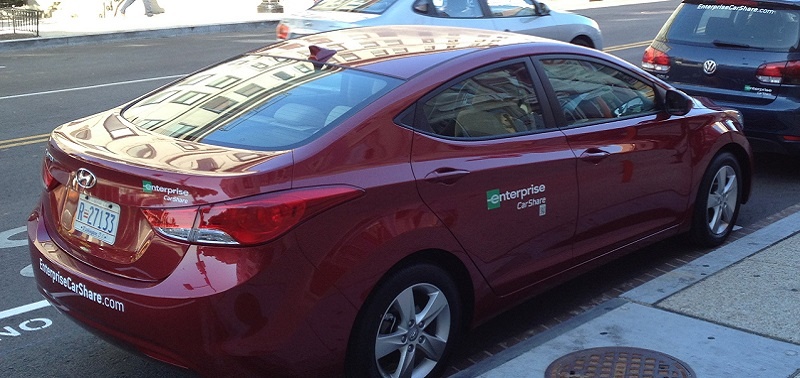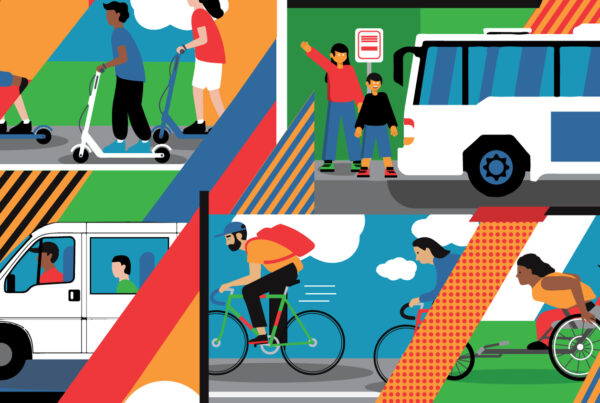One of the biggest barriers to growing carsharing in dense urban areas is finding and financing parking space for vehicles. Cars need to be accessible to be useful, but often end up in alleys and parking garages due to competition with private vehicles for prime space.
However, parking vehicles on public streets has several distinct advantages, ranging from increased visibility to better convenience and availability.
To help give carsharing a boost, several cities – including Seattle, San Francisco and Boston – have recently taken the lead in conducting pilot programs that make dedicated on-street parking available for shared vehicles.
These pilots have irked some residents, who are concerned with losing street parking spaces to carshare vehicles. However, city officials make the case that carsharing actually helps take cars off the road, thereby alleviating congestion and pressures on parking in the long term.
Studies have shown that each traditional carshare car takes between 9 and 13 cars off the road. The effects of free-floating carsharing have not been studied as closely, but operator car2Go has estimated that more than 2,000 of its Seattle members have sold their personal vehicles since joining.
While each of these communities has taken a slightly different approach to implementing on-street carshare parking, other cities can learn a great deal by following their progress and the steps they have taken to design their pilots.
Seattle
The initial success of Seattle’s 350-space on-street parking pilot in 2013 led its city council to further expand the program in January 2015, passing new legislation that:
–Caps the number of total carshare operators at four. Currently only Car2Go operates in the city but two others, Zipcar and BMW’s DriveNow, have expressed interest
–Expands the pilot program’s service area to the entire city, up from the current service area of about two-thirds of the city
–Requires new operators to serve the entire city after two years in exchange for an increased cap of 750 vehicles per operator
–Increased the permit cost per vehicle from $1,330 to $1,730.
Seattle’s free-floating parking program means that carshare users are free to park in any public space. If the operator’s use of paid parking areas exceeds the total cost of the yearly permit, the company is responsible for reimbursing the City of Seattle.
The city estimates it will bring in $2.2 million in permit revenue in 2015 with an estimated 1,300 free-floating vehicles, and $3.4 million in 2016 with 2,000 vehicles.
San Francisco
The San Francisco Municipal Transit Authority’s on-street parking pilot, which first launched in 2013, dedicates 900 of the city’s approximately 280,000 street parking spaces for use by carshare operators. Unlike Seattle’s pilot, San Francisco assigns specific parking spaces to vehicles.
As of January 2015 SFMTA has approved three operators: Zipcar, City Car Share and Getaround. Each company has requested 150 parking spots.
The SFMTA collects a $400 installation fee for each parking space and charges monthly rent per space – ranging from $250 to $50 – based on location in the city. Through participation in the SFMTA pilot, operators must also:
–Make vehicles available for use at least 75 percent of the time
–Provide an outreach plan to reach new members
–Administer an SFMTA survey to members
–Provide data to SFMTA, including vehicle locations, total members in San Francisco summarized by zip code, vehicle utilization rates and trip VMT and departure/destination points.
Boston
The City of Boston is in the process of launching its own pilot in 2015 that will set aside approximately 200 on-street parking spaces for carsharing vehicles. Through the program, operators will have the chance to bid on both specific on-street spaces, like those in San Francisco’s pilot, and permits for free-floating services to park in metered spaces like those used in Seattle.
Boston is home to Zipcar, which is expected to bid on the spots, but other operators such as Car2Go have expressed an interest as well. The bids are expected to bring in new revenue for the city, but city officials have said the primary goal is to encourage more people to go car-free, eventually opening up more spaces.
Responses to the city’s RFP are due on Monday, February 23 and city officials expect to award contracts by early summer. The one-year pilot could also be broadened if successful.
The Shared-Use Mobility Center will continue tracking pilots, ordinances and legislation in the coming year using our forthcoming policy database. For questions about our database and other tools for cities, please contact us.



